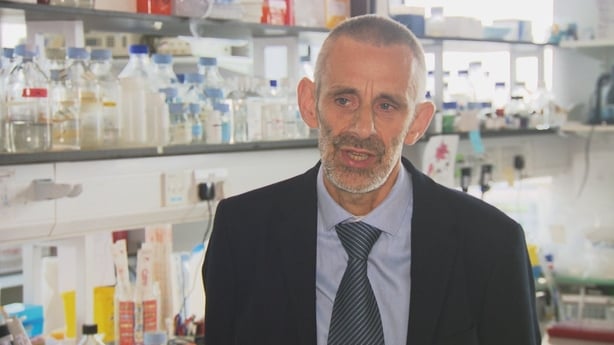New figures from the Health Service Executive show the number of deaths from or with Covid-19 in nursing homes, in hospitals linked to outbreaks and in disability residential centres, since the start of the pandemic.
Of 8,545 Covid-19 deaths in Ireland, 2,323 or over 27% were in nursing homes.
The data covers the period from March 2020 until mid-February this year.
In acute hospitals, 12,582 confirmed cases were linked to outbreaks affecting patients or staff.
There have been 1,126 deaths linked to hospital outbreaks, involving patients or staff.
This figure breaks down as 1,121 confirmed Covid-19 cases and 5 possible Covid-19 cases.
In HSE-run disability residential centres there have been 59 Covid-19 deaths recorded.
The data was provided to Aontú leader Peadar Tóibín by the HSE's Health Protection Surveillance Centre in answers to a series of Parliamentary Questions.
The HSE said that it is not possible to reliably identify sporadic cases that may have contracted Covid-19 in hospital and that its case data relates to cases that were linked to hospital outbreaks.
It also said it is not possible to confirm that all cases linked to these outbreaks in hospital contracted Covid-19, while in the hospital setting.
Today effectively marks the third anniversary of the first officially confirmed case of Covid-19 here, on 29 February 2020.
Since then there have been over 1.7 million PCR-confirmed cases of Covid-19.
The Department of Health said today that based on the latest data from the European Centre for Disease Prevention and Control, Ireland experienced the sixth lowest Covid-19 death rate for every 100,000 of the population, out of 28 EU/UK countries, in the pandemic to date.
State inquiry
The Government intends to establish an inquiry into the State's handling of the Covid-19 pandemic by the middle of the year.
Decisions about the format of the inquiry including whether it should hold public sessions have not yet been made.

Kingston Mills, Professor of Experimental Immunology at the School of Biochemistry and Immunology at Trinity College Dublin, has said the important aspect about any inquiry is preparing for the next pandemic rather than blaming people for mistakes that were made during the Covid-19 pandemic.
Speaking to RTÉ's Drivetime he said: "Everybody was under a lot of pressure, the Government, the HSE, the Department of Health and they had to make a lot of rapid decisions which weren't very popular amongst the public."
He said a lot of the decisions that were made during the pandemic were made to protect people, especially vulnerable people.
He said by and large the Government and Ireland as a country did very well, particularly with vaccination.
However, he said some mistakes were made and "sometimes our Government, the Department of Health and the HSE were slow to react to some emerging scientific evidence", such as mask wearing and antigen testing.
Asked if he thought that a total lockdown during some parts of the pandemic were inappropriate, Prof Mills said: "You have to put yourself back in the position that you were in then rather than looking at it from now because it's very easy now to say 'what was the right thing to do' because you have a lot more information than you had then."
He said the reality at the time was that hospitals were being overwhelmed, intensive care units were at full capacity and people were dying from Covid-19 and all the evidence from international studies and other countries was that limiting the interaction between people was one way of stopping transmission and slowing down the transmission and giving the hospitals a chance to contain the infection.






